Consumer Behaviour in Tourism: Analysis of Key Influencing Factors
VerifiedAdded on 2023/06/17
|7
|2280
|121
Report
AI Summary
This report provides an analysis of consumer behaviour, focusing on the tourism sector. It explores the various micro and macro factors that influence consumer buying decisions, such as personal, psychological, and social aspects. The report discusses key theories, including involvement theory, perceptual process, and cognitive dissonance, illustrating their impact with relevant examples. It also examines the influence of cultural values, reference groups, and social media on consumer choices. Furthermore, the report delves into complex buying behaviours and patterns within the tourism context. The conclusion highlights the importance of understanding these factors for businesses aiming to enhance their strategies and productivity in the tourism industry. Desklib offers a platform where students can access this and similar solved assignments.
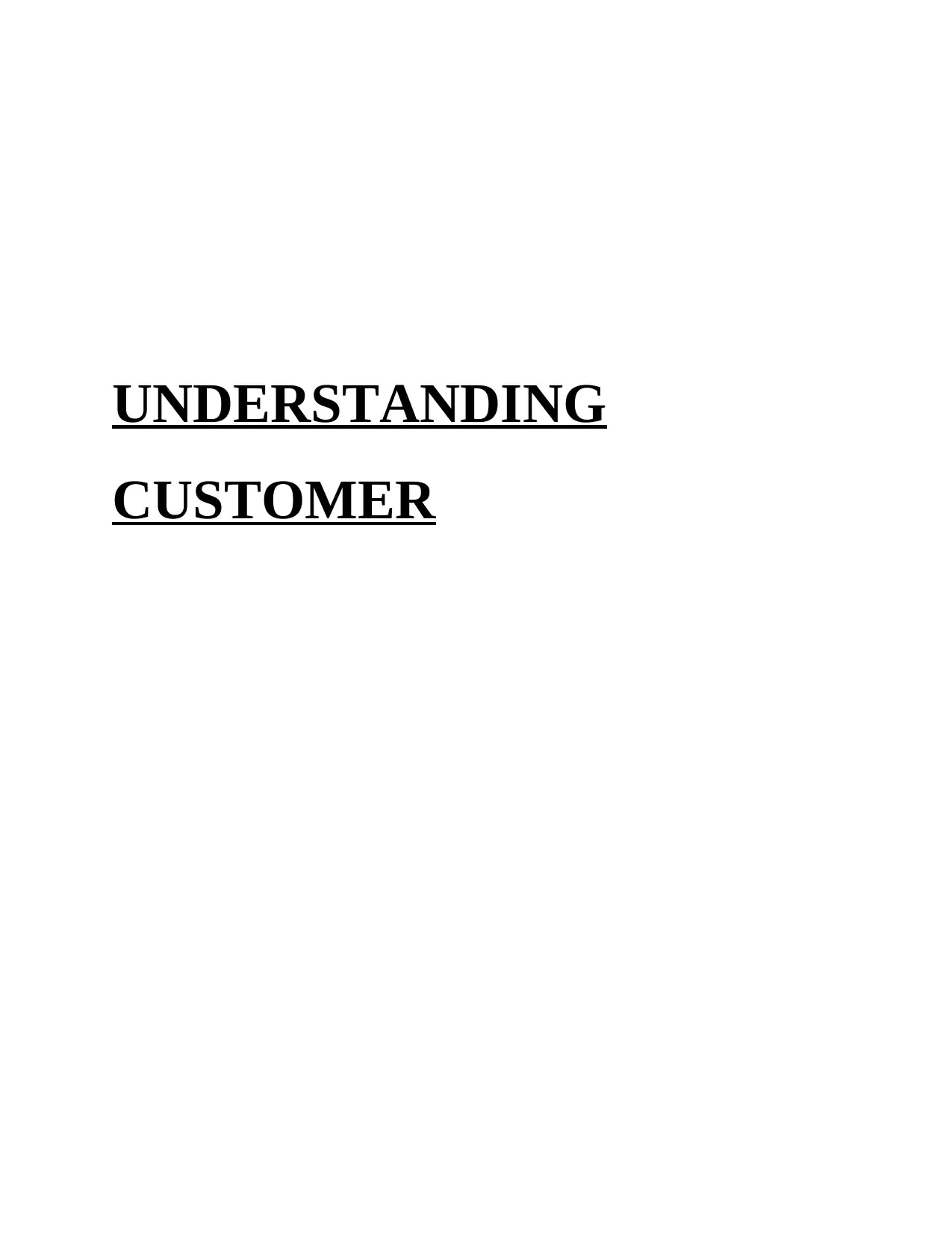
UNDERSTANDING
CUSTOMER
CUSTOMER
Paraphrase This Document
Need a fresh take? Get an instant paraphrase of this document with our AI Paraphraser
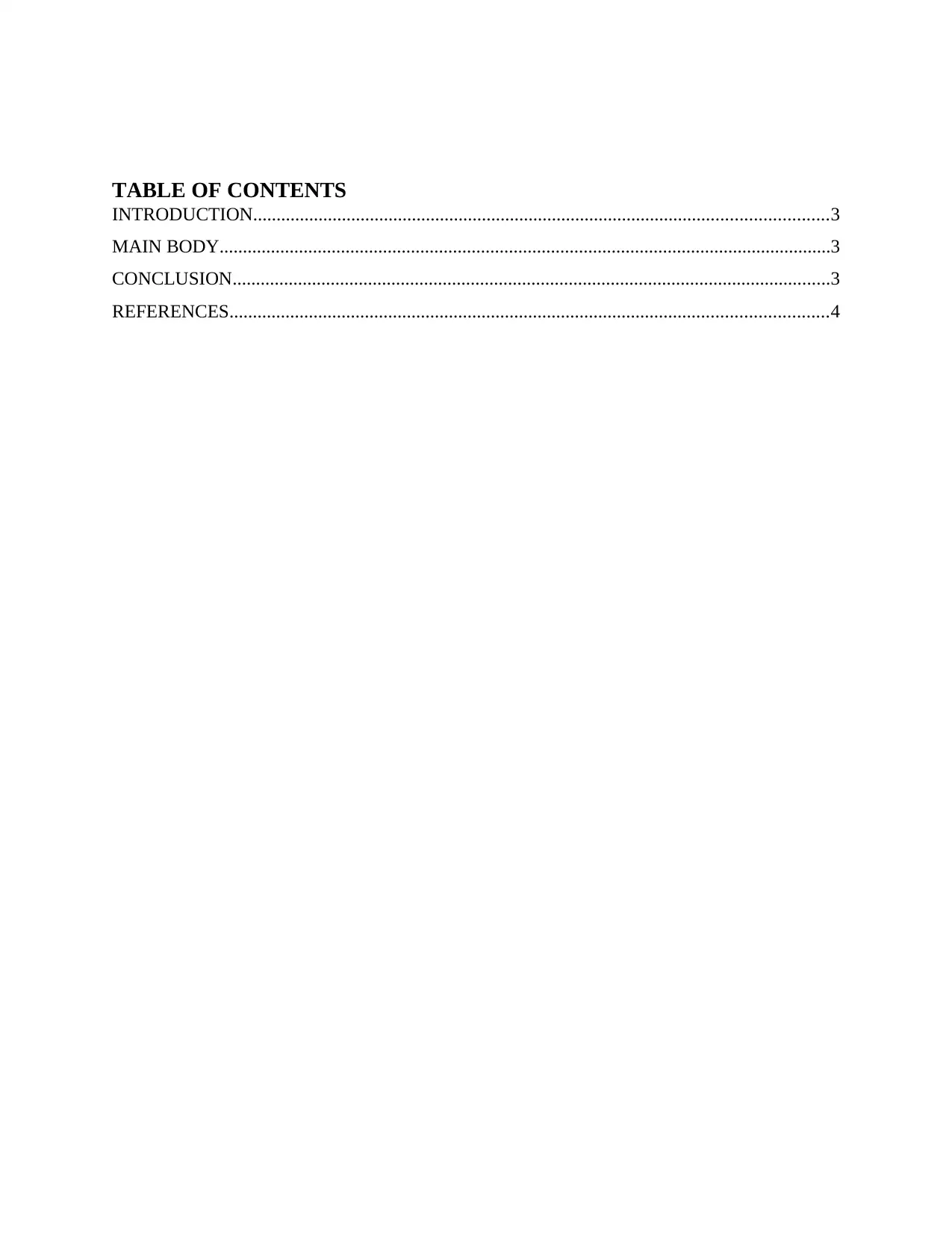
TABLE OF CONTENTS
INTRODUCTION...........................................................................................................................3
MAIN BODY...................................................................................................................................3
CONCLUSION................................................................................................................................3
REFERENCES................................................................................................................................4
INTRODUCTION...........................................................................................................................3
MAIN BODY...................................................................................................................................3
CONCLUSION................................................................................................................................3
REFERENCES................................................................................................................................4
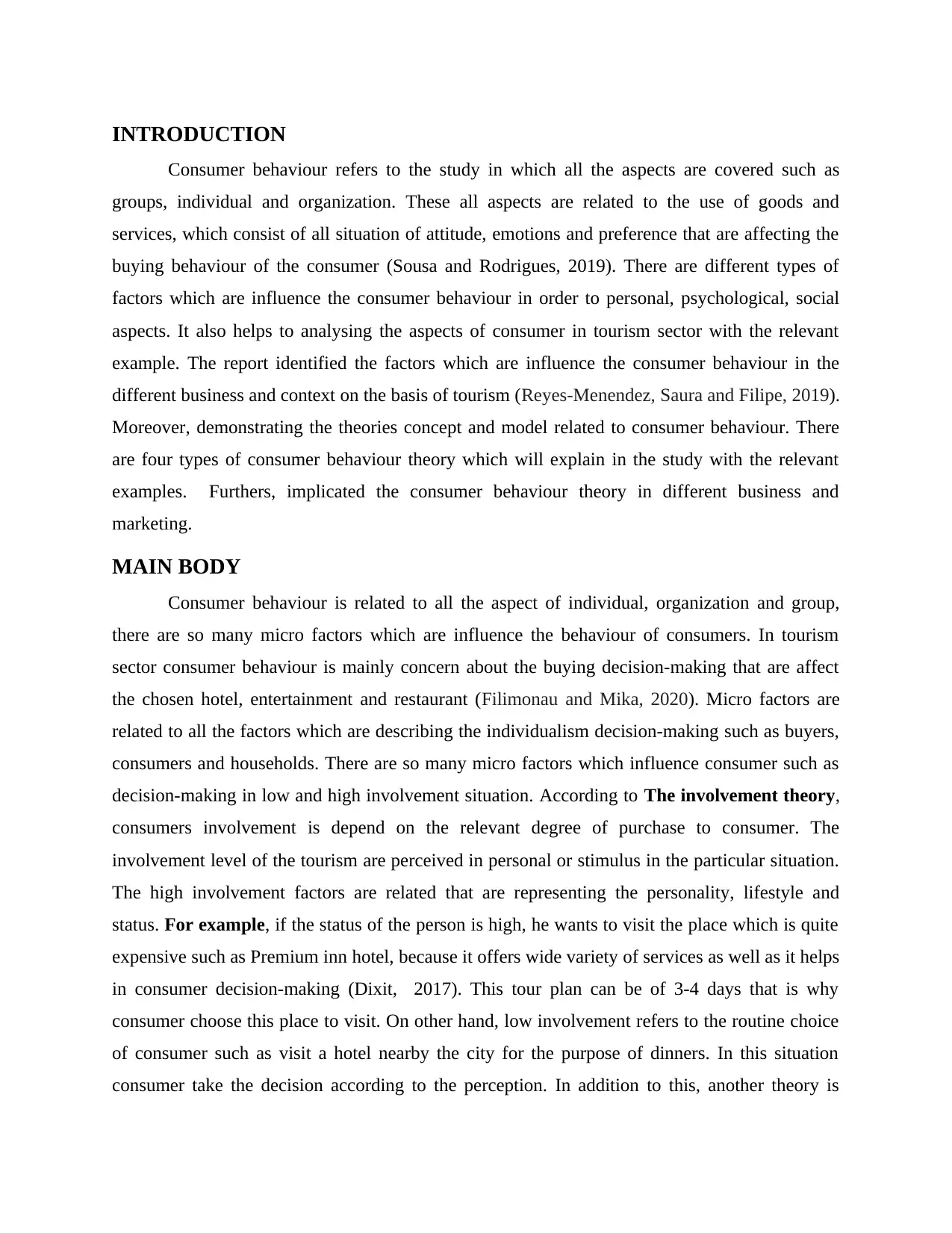
INTRODUCTION
Consumer behaviour refers to the study in which all the aspects are covered such as
groups, individual and organization. These all aspects are related to the use of goods and
services, which consist of all situation of attitude, emotions and preference that are affecting the
buying behaviour of the consumer (Sousa and Rodrigues, 2019). There are different types of
factors which are influence the consumer behaviour in order to personal, psychological, social
aspects. It also helps to analysing the aspects of consumer in tourism sector with the relevant
example. The report identified the factors which are influence the consumer behaviour in the
different business and context on the basis of tourism (Reyes-Menendez, Saura and Filipe, 2019).
Moreover, demonstrating the theories concept and model related to consumer behaviour. There
are four types of consumer behaviour theory which will explain in the study with the relevant
examples. Furthers, implicated the consumer behaviour theory in different business and
marketing.
MAIN BODY
Consumer behaviour is related to all the aspect of individual, organization and group,
there are so many micro factors which are influence the behaviour of consumers. In tourism
sector consumer behaviour is mainly concern about the buying decision-making that are affect
the chosen hotel, entertainment and restaurant (Filimonau and Mika, 2020). Micro factors are
related to all the factors which are describing the individualism decision-making such as buyers,
consumers and households. There are so many micro factors which influence consumer such as
decision-making in low and high involvement situation. According to The involvement theory,
consumers involvement is depend on the relevant degree of purchase to consumer. The
involvement level of the tourism are perceived in personal or stimulus in the particular situation.
The high involvement factors are related that are representing the personality, lifestyle and
status. For example, if the status of the person is high, he wants to visit the place which is quite
expensive such as Premium inn hotel, because it offers wide variety of services as well as it helps
in consumer decision-making (Dixit, 2017). This tour plan can be of 3-4 days that is why
consumer choose this place to visit. On other hand, low involvement refers to the routine choice
of consumer such as visit a hotel nearby the city for the purpose of dinners. In this situation
consumer take the decision according to the perception. In addition to this, another theory is
Consumer behaviour refers to the study in which all the aspects are covered such as
groups, individual and organization. These all aspects are related to the use of goods and
services, which consist of all situation of attitude, emotions and preference that are affecting the
buying behaviour of the consumer (Sousa and Rodrigues, 2019). There are different types of
factors which are influence the consumer behaviour in order to personal, psychological, social
aspects. It also helps to analysing the aspects of consumer in tourism sector with the relevant
example. The report identified the factors which are influence the consumer behaviour in the
different business and context on the basis of tourism (Reyes-Menendez, Saura and Filipe, 2019).
Moreover, demonstrating the theories concept and model related to consumer behaviour. There
are four types of consumer behaviour theory which will explain in the study with the relevant
examples. Furthers, implicated the consumer behaviour theory in different business and
marketing.
MAIN BODY
Consumer behaviour is related to all the aspect of individual, organization and group,
there are so many micro factors which are influence the behaviour of consumers. In tourism
sector consumer behaviour is mainly concern about the buying decision-making that are affect
the chosen hotel, entertainment and restaurant (Filimonau and Mika, 2020). Micro factors are
related to all the factors which are describing the individualism decision-making such as buyers,
consumers and households. There are so many micro factors which influence consumer such as
decision-making in low and high involvement situation. According to The involvement theory,
consumers involvement is depend on the relevant degree of purchase to consumer. The
involvement level of the tourism are perceived in personal or stimulus in the particular situation.
The high involvement factors are related that are representing the personality, lifestyle and
status. For example, if the status of the person is high, he wants to visit the place which is quite
expensive such as Premium inn hotel, because it offers wide variety of services as well as it helps
in consumer decision-making (Dixit, 2017). This tour plan can be of 3-4 days that is why
consumer choose this place to visit. On other hand, low involvement refers to the routine choice
of consumer such as visit a hotel nearby the city for the purpose of dinners. In this situation
consumer take the decision according to the perception. In addition to this, another theory is
⊘ This is a preview!⊘
Do you want full access?
Subscribe today to unlock all pages.

Trusted by 1+ million students worldwide
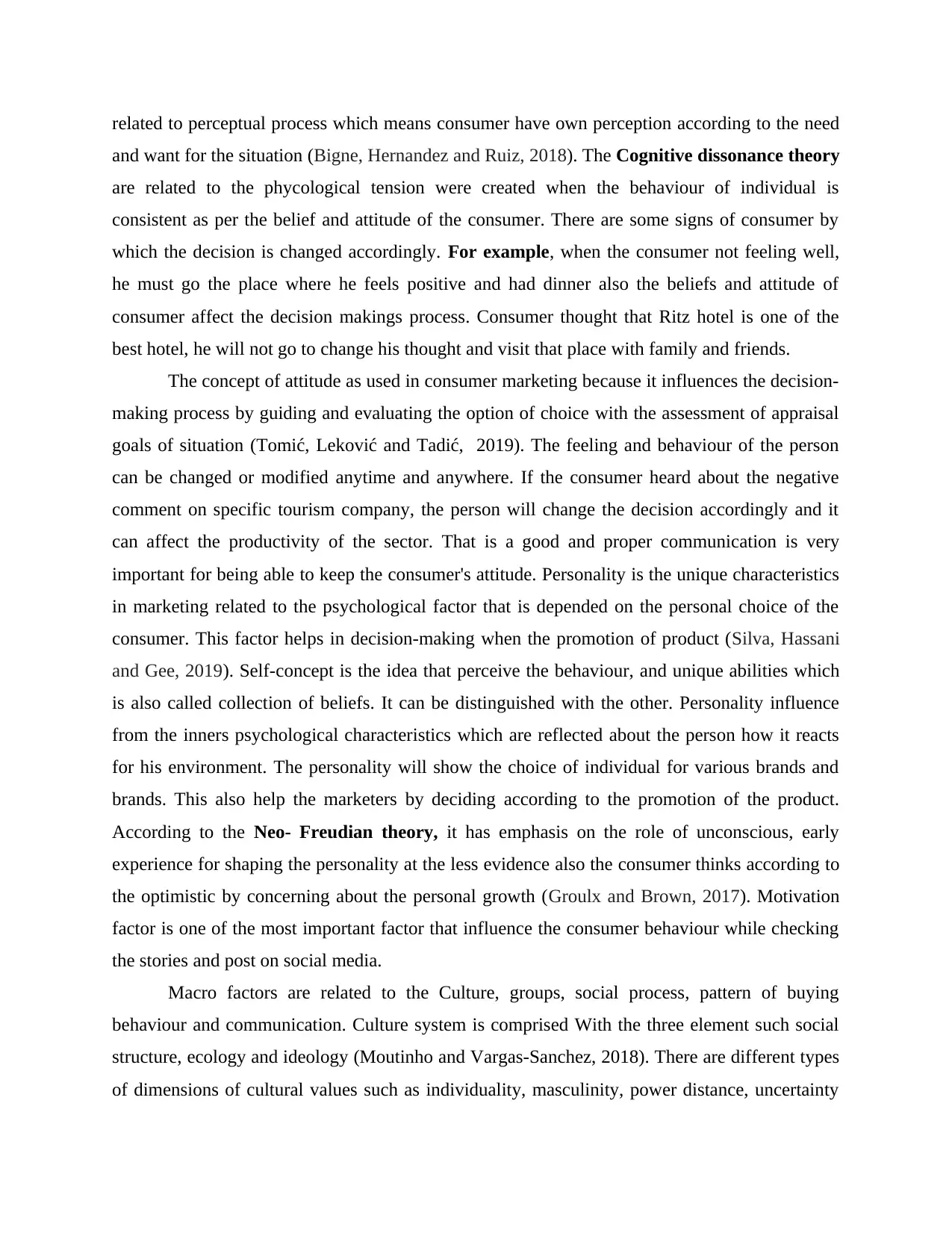
related to perceptual process which means consumer have own perception according to the need
and want for the situation (Bigne, Hernandez and Ruiz, 2018). The Cognitive dissonance theory
are related to the phycological tension were created when the behaviour of individual is
consistent as per the belief and attitude of the consumer. There are some signs of consumer by
which the decision is changed accordingly. For example, when the consumer not feeling well,
he must go the place where he feels positive and had dinner also the beliefs and attitude of
consumer affect the decision makings process. Consumer thought that Ritz hotel is one of the
best hotel, he will not go to change his thought and visit that place with family and friends.
The concept of attitude as used in consumer marketing because it influences the decision-
making process by guiding and evaluating the option of choice with the assessment of appraisal
goals of situation (Tomić, Leković and Tadić, 2019). The feeling and behaviour of the person
can be changed or modified anytime and anywhere. If the consumer heard about the negative
comment on specific tourism company, the person will change the decision accordingly and it
can affect the productivity of the sector. That is a good and proper communication is very
important for being able to keep the consumer's attitude. Personality is the unique characteristics
in marketing related to the psychological factor that is depended on the personal choice of the
consumer. This factor helps in decision-making when the promotion of product (Silva, Hassani
and Gee, 2019). Self-concept is the idea that perceive the behaviour, and unique abilities which
is also called collection of beliefs. It can be distinguished with the other. Personality influence
from the inners psychological characteristics which are reflected about the person how it reacts
for his environment. The personality will show the choice of individual for various brands and
brands. This also help the marketers by deciding according to the promotion of the product.
According to the Neo- Freudian theory, it has emphasis on the role of unconscious, early
experience for shaping the personality at the less evidence also the consumer thinks according to
the optimistic by concerning about the personal growth (Groulx and Brown, 2017). Motivation
factor is one of the most important factor that influence the consumer behaviour while checking
the stories and post on social media.
Macro factors are related to the Culture, groups, social process, pattern of buying
behaviour and communication. Culture system is comprised With the three element such social
structure, ecology and ideology (Moutinho and Vargas-Sanchez, 2018). There are different types
of dimensions of cultural values such as individuality, masculinity, power distance, uncertainty
and want for the situation (Bigne, Hernandez and Ruiz, 2018). The Cognitive dissonance theory
are related to the phycological tension were created when the behaviour of individual is
consistent as per the belief and attitude of the consumer. There are some signs of consumer by
which the decision is changed accordingly. For example, when the consumer not feeling well,
he must go the place where he feels positive and had dinner also the beliefs and attitude of
consumer affect the decision makings process. Consumer thought that Ritz hotel is one of the
best hotel, he will not go to change his thought and visit that place with family and friends.
The concept of attitude as used in consumer marketing because it influences the decision-
making process by guiding and evaluating the option of choice with the assessment of appraisal
goals of situation (Tomić, Leković and Tadić, 2019). The feeling and behaviour of the person
can be changed or modified anytime and anywhere. If the consumer heard about the negative
comment on specific tourism company, the person will change the decision accordingly and it
can affect the productivity of the sector. That is a good and proper communication is very
important for being able to keep the consumer's attitude. Personality is the unique characteristics
in marketing related to the psychological factor that is depended on the personal choice of the
consumer. This factor helps in decision-making when the promotion of product (Silva, Hassani
and Gee, 2019). Self-concept is the idea that perceive the behaviour, and unique abilities which
is also called collection of beliefs. It can be distinguished with the other. Personality influence
from the inners psychological characteristics which are reflected about the person how it reacts
for his environment. The personality will show the choice of individual for various brands and
brands. This also help the marketers by deciding according to the promotion of the product.
According to the Neo- Freudian theory, it has emphasis on the role of unconscious, early
experience for shaping the personality at the less evidence also the consumer thinks according to
the optimistic by concerning about the personal growth (Groulx and Brown, 2017). Motivation
factor is one of the most important factor that influence the consumer behaviour while checking
the stories and post on social media.
Macro factors are related to the Culture, groups, social process, pattern of buying
behaviour and communication. Culture system is comprised With the three element such social
structure, ecology and ideology (Moutinho and Vargas-Sanchez, 2018). There are different types
of dimensions of cultural values such as individuality, masculinity, power distance, uncertainty
Paraphrase This Document
Need a fresh take? Get an instant paraphrase of this document with our AI Paraphraser
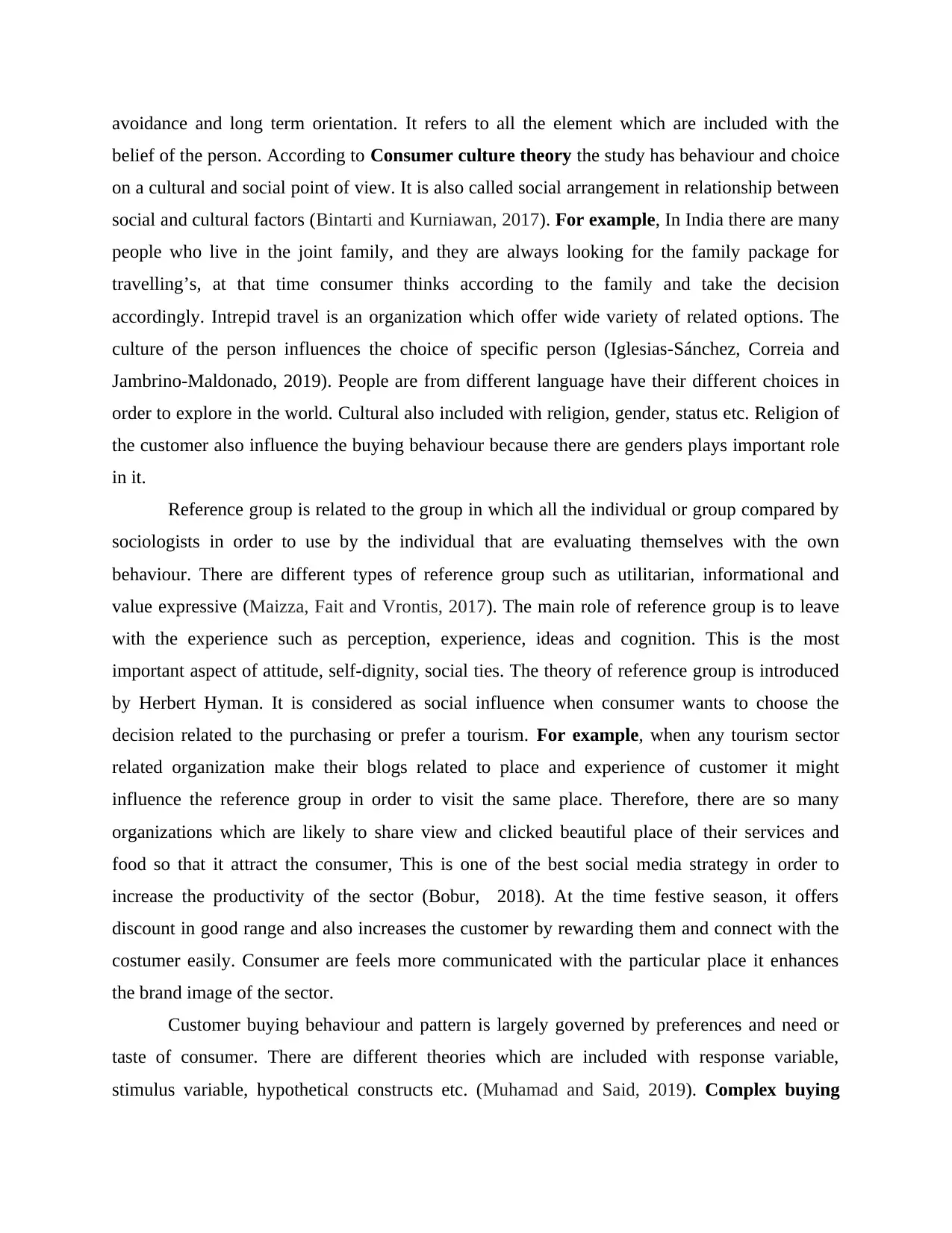
avoidance and long term orientation. It refers to all the element which are included with the
belief of the person. According to Consumer culture theory the study has behaviour and choice
on a cultural and social point of view. It is also called social arrangement in relationship between
social and cultural factors (Bintarti and Kurniawan, 2017). For example, In India there are many
people who live in the joint family, and they are always looking for the family package for
travelling’s, at that time consumer thinks according to the family and take the decision
accordingly. Intrepid travel is an organization which offer wide variety of related options. The
culture of the person influences the choice of specific person (Iglesias-Sánchez, Correia and
Jambrino-Maldonado, 2019). People are from different language have their different choices in
order to explore in the world. Cultural also included with religion, gender, status etc. Religion of
the customer also influence the buying behaviour because there are genders plays important role
in it.
Reference group is related to the group in which all the individual or group compared by
sociologists in order to use by the individual that are evaluating themselves with the own
behaviour. There are different types of reference group such as utilitarian, informational and
value expressive (Maizza, Fait and Vrontis, 2017). The main role of reference group is to leave
with the experience such as perception, experience, ideas and cognition. This is the most
important aspect of attitude, self-dignity, social ties. The theory of reference group is introduced
by Herbert Hyman. It is considered as social influence when consumer wants to choose the
decision related to the purchasing or prefer a tourism. For example, when any tourism sector
related organization make their blogs related to place and experience of customer it might
influence the reference group in order to visit the same place. Therefore, there are so many
organizations which are likely to share view and clicked beautiful place of their services and
food so that it attract the consumer, This is one of the best social media strategy in order to
increase the productivity of the sector (Bobur, 2018). At the time festive season, it offers
discount in good range and also increases the customer by rewarding them and connect with the
costumer easily. Consumer are feels more communicated with the particular place it enhances
the brand image of the sector.
Customer buying behaviour and pattern is largely governed by preferences and need or
taste of consumer. There are different theories which are included with response variable,
stimulus variable, hypothetical constructs etc. (Muhamad and Said, 2019). Complex buying
belief of the person. According to Consumer culture theory the study has behaviour and choice
on a cultural and social point of view. It is also called social arrangement in relationship between
social and cultural factors (Bintarti and Kurniawan, 2017). For example, In India there are many
people who live in the joint family, and they are always looking for the family package for
travelling’s, at that time consumer thinks according to the family and take the decision
accordingly. Intrepid travel is an organization which offer wide variety of related options. The
culture of the person influences the choice of specific person (Iglesias-Sánchez, Correia and
Jambrino-Maldonado, 2019). People are from different language have their different choices in
order to explore in the world. Cultural also included with religion, gender, status etc. Religion of
the customer also influence the buying behaviour because there are genders plays important role
in it.
Reference group is related to the group in which all the individual or group compared by
sociologists in order to use by the individual that are evaluating themselves with the own
behaviour. There are different types of reference group such as utilitarian, informational and
value expressive (Maizza, Fait and Vrontis, 2017). The main role of reference group is to leave
with the experience such as perception, experience, ideas and cognition. This is the most
important aspect of attitude, self-dignity, social ties. The theory of reference group is introduced
by Herbert Hyman. It is considered as social influence when consumer wants to choose the
decision related to the purchasing or prefer a tourism. For example, when any tourism sector
related organization make their blogs related to place and experience of customer it might
influence the reference group in order to visit the same place. Therefore, there are so many
organizations which are likely to share view and clicked beautiful place of their services and
food so that it attract the consumer, This is one of the best social media strategy in order to
increase the productivity of the sector (Bobur, 2018). At the time festive season, it offers
discount in good range and also increases the customer by rewarding them and connect with the
costumer easily. Consumer are feels more communicated with the particular place it enhances
the brand image of the sector.
Customer buying behaviour and pattern is largely governed by preferences and need or
taste of consumer. There are different theories which are included with response variable,
stimulus variable, hypothetical constructs etc. (Muhamad and Said, 2019). Complex buying
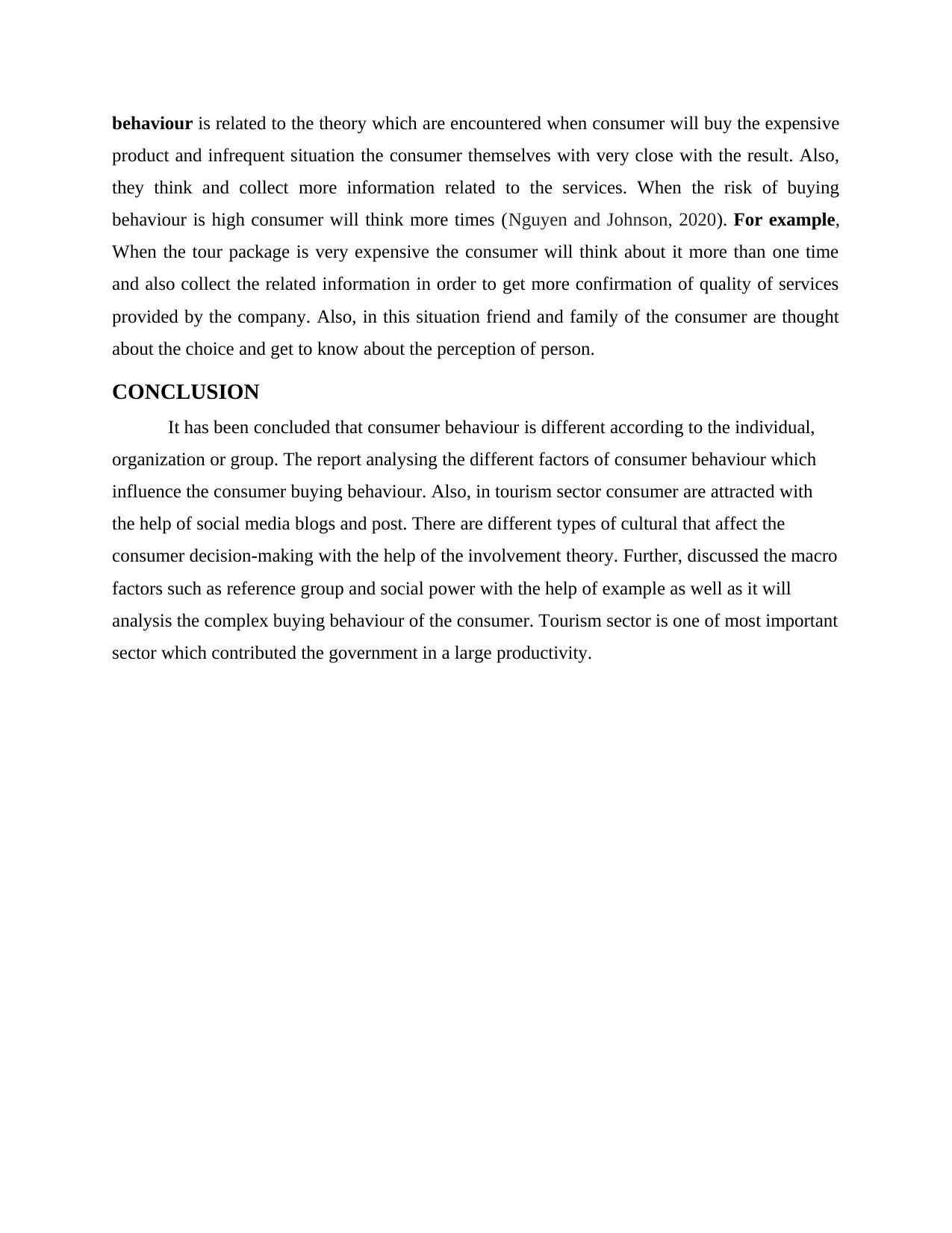
behaviour is related to the theory which are encountered when consumer will buy the expensive
product and infrequent situation the consumer themselves with very close with the result. Also,
they think and collect more information related to the services. When the risk of buying
behaviour is high consumer will think more times (Nguyen and Johnson, 2020). For example,
When the tour package is very expensive the consumer will think about it more than one time
and also collect the related information in order to get more confirmation of quality of services
provided by the company. Also, in this situation friend and family of the consumer are thought
about the choice and get to know about the perception of person.
CONCLUSION
It has been concluded that consumer behaviour is different according to the individual,
organization or group. The report analysing the different factors of consumer behaviour which
influence the consumer buying behaviour. Also, in tourism sector consumer are attracted with
the help of social media blogs and post. There are different types of cultural that affect the
consumer decision-making with the help of the involvement theory. Further, discussed the macro
factors such as reference group and social power with the help of example as well as it will
analysis the complex buying behaviour of the consumer. Tourism sector is one of most important
sector which contributed the government in a large productivity.
product and infrequent situation the consumer themselves with very close with the result. Also,
they think and collect more information related to the services. When the risk of buying
behaviour is high consumer will think more times (Nguyen and Johnson, 2020). For example,
When the tour package is very expensive the consumer will think about it more than one time
and also collect the related information in order to get more confirmation of quality of services
provided by the company. Also, in this situation friend and family of the consumer are thought
about the choice and get to know about the perception of person.
CONCLUSION
It has been concluded that consumer behaviour is different according to the individual,
organization or group. The report analysing the different factors of consumer behaviour which
influence the consumer buying behaviour. Also, in tourism sector consumer are attracted with
the help of social media blogs and post. There are different types of cultural that affect the
consumer decision-making with the help of the involvement theory. Further, discussed the macro
factors such as reference group and social power with the help of example as well as it will
analysis the complex buying behaviour of the consumer. Tourism sector is one of most important
sector which contributed the government in a large productivity.
⊘ This is a preview!⊘
Do you want full access?
Subscribe today to unlock all pages.

Trusted by 1+ million students worldwide
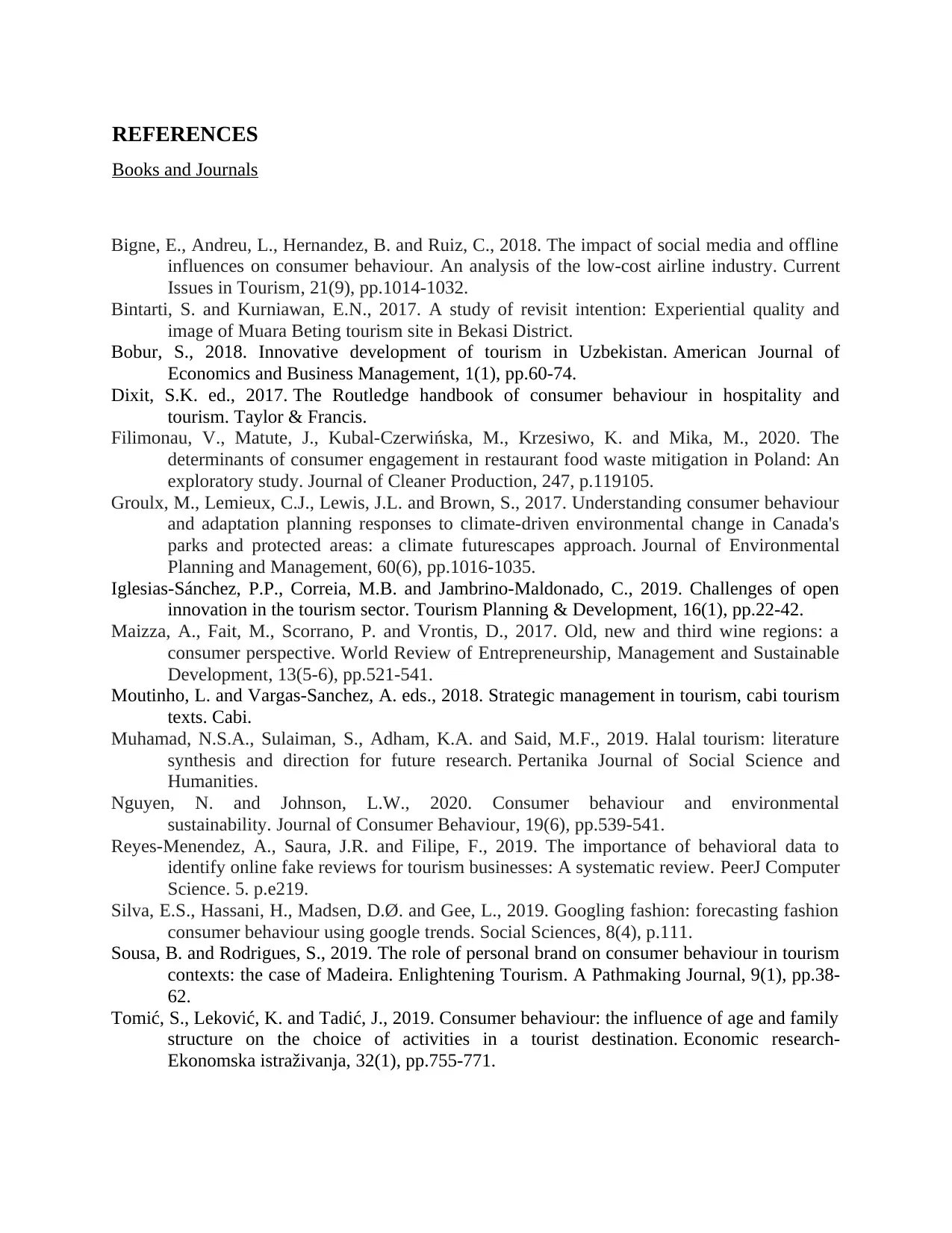
REFERENCES
Books and Journals
Bigne, E., Andreu, L., Hernandez, B. and Ruiz, C., 2018. The impact of social media and offline
influences on consumer behaviour. An analysis of the low-cost airline industry. Current
Issues in Tourism, 21(9), pp.1014-1032.
Bintarti, S. and Kurniawan, E.N., 2017. A study of revisit intention: Experiential quality and
image of Muara Beting tourism site in Bekasi District.
Bobur, S., 2018. Innovative development of tourism in Uzbekistan. American Journal of
Economics and Business Management, 1(1), pp.60-74.
Dixit, S.K. ed., 2017. The Routledge handbook of consumer behaviour in hospitality and
tourism. Taylor & Francis.
Filimonau, V., Matute, J., Kubal-Czerwińska, M., Krzesiwo, K. and Mika, M., 2020. The
determinants of consumer engagement in restaurant food waste mitigation in Poland: An
exploratory study. Journal of Cleaner Production, 247, p.119105.
Groulx, M., Lemieux, C.J., Lewis, J.L. and Brown, S., 2017. Understanding consumer behaviour
and adaptation planning responses to climate-driven environmental change in Canada's
parks and protected areas: a climate futurescapes approach. Journal of Environmental
Planning and Management, 60(6), pp.1016-1035.
Iglesias-Sánchez, P.P., Correia, M.B. and Jambrino-Maldonado, C., 2019. Challenges of open
innovation in the tourism sector. Tourism Planning & Development, 16(1), pp.22-42.
Maizza, A., Fait, M., Scorrano, P. and Vrontis, D., 2017. Old, new and third wine regions: a
consumer perspective. World Review of Entrepreneurship, Management and Sustainable
Development, 13(5-6), pp.521-541.
Moutinho, L. and Vargas-Sanchez, A. eds., 2018. Strategic management in tourism, cabi tourism
texts. Cabi.
Muhamad, N.S.A., Sulaiman, S., Adham, K.A. and Said, M.F., 2019. Halal tourism: literature
synthesis and direction for future research. Pertanika Journal of Social Science and
Humanities.
Nguyen, N. and Johnson, L.W., 2020. Consumer behaviour and environmental
sustainability. Journal of Consumer Behaviour, 19(6), pp.539-541.
Reyes-Menendez, A., Saura, J.R. and Filipe, F., 2019. The importance of behavioral data to
identify online fake reviews for tourism businesses: A systematic review. PeerJ Computer
Science. 5. p.e219.
Silva, E.S., Hassani, H., Madsen, D.Ø. and Gee, L., 2019. Googling fashion: forecasting fashion
consumer behaviour using google trends. Social Sciences, 8(4), p.111.
Sousa, B. and Rodrigues, S., 2019. The role of personal brand on consumer behaviour in tourism
contexts: the case of Madeira. Enlightening Tourism. A Pathmaking Journal, 9(1), pp.38-
62.
Tomić, S., Leković, K. and Tadić, J., 2019. Consumer behaviour: the influence of age and family
structure on the choice of activities in a tourist destination. Economic research-
Ekonomska istraživanja, 32(1), pp.755-771.
Books and Journals
Bigne, E., Andreu, L., Hernandez, B. and Ruiz, C., 2018. The impact of social media and offline
influences on consumer behaviour. An analysis of the low-cost airline industry. Current
Issues in Tourism, 21(9), pp.1014-1032.
Bintarti, S. and Kurniawan, E.N., 2017. A study of revisit intention: Experiential quality and
image of Muara Beting tourism site in Bekasi District.
Bobur, S., 2018. Innovative development of tourism in Uzbekistan. American Journal of
Economics and Business Management, 1(1), pp.60-74.
Dixit, S.K. ed., 2017. The Routledge handbook of consumer behaviour in hospitality and
tourism. Taylor & Francis.
Filimonau, V., Matute, J., Kubal-Czerwińska, M., Krzesiwo, K. and Mika, M., 2020. The
determinants of consumer engagement in restaurant food waste mitigation in Poland: An
exploratory study. Journal of Cleaner Production, 247, p.119105.
Groulx, M., Lemieux, C.J., Lewis, J.L. and Brown, S., 2017. Understanding consumer behaviour
and adaptation planning responses to climate-driven environmental change in Canada's
parks and protected areas: a climate futurescapes approach. Journal of Environmental
Planning and Management, 60(6), pp.1016-1035.
Iglesias-Sánchez, P.P., Correia, M.B. and Jambrino-Maldonado, C., 2019. Challenges of open
innovation in the tourism sector. Tourism Planning & Development, 16(1), pp.22-42.
Maizza, A., Fait, M., Scorrano, P. and Vrontis, D., 2017. Old, new and third wine regions: a
consumer perspective. World Review of Entrepreneurship, Management and Sustainable
Development, 13(5-6), pp.521-541.
Moutinho, L. and Vargas-Sanchez, A. eds., 2018. Strategic management in tourism, cabi tourism
texts. Cabi.
Muhamad, N.S.A., Sulaiman, S., Adham, K.A. and Said, M.F., 2019. Halal tourism: literature
synthesis and direction for future research. Pertanika Journal of Social Science and
Humanities.
Nguyen, N. and Johnson, L.W., 2020. Consumer behaviour and environmental
sustainability. Journal of Consumer Behaviour, 19(6), pp.539-541.
Reyes-Menendez, A., Saura, J.R. and Filipe, F., 2019. The importance of behavioral data to
identify online fake reviews for tourism businesses: A systematic review. PeerJ Computer
Science. 5. p.e219.
Silva, E.S., Hassani, H., Madsen, D.Ø. and Gee, L., 2019. Googling fashion: forecasting fashion
consumer behaviour using google trends. Social Sciences, 8(4), p.111.
Sousa, B. and Rodrigues, S., 2019. The role of personal brand on consumer behaviour in tourism
contexts: the case of Madeira. Enlightening Tourism. A Pathmaking Journal, 9(1), pp.38-
62.
Tomić, S., Leković, K. and Tadić, J., 2019. Consumer behaviour: the influence of age and family
structure on the choice of activities in a tourist destination. Economic research-
Ekonomska istraživanja, 32(1), pp.755-771.
1 out of 7
Related Documents
Your All-in-One AI-Powered Toolkit for Academic Success.
+13062052269
info@desklib.com
Available 24*7 on WhatsApp / Email
![[object Object]](/_next/static/media/star-bottom.7253800d.svg)
Unlock your academic potential
Copyright © 2020–2026 A2Z Services. All Rights Reserved. Developed and managed by ZUCOL.


